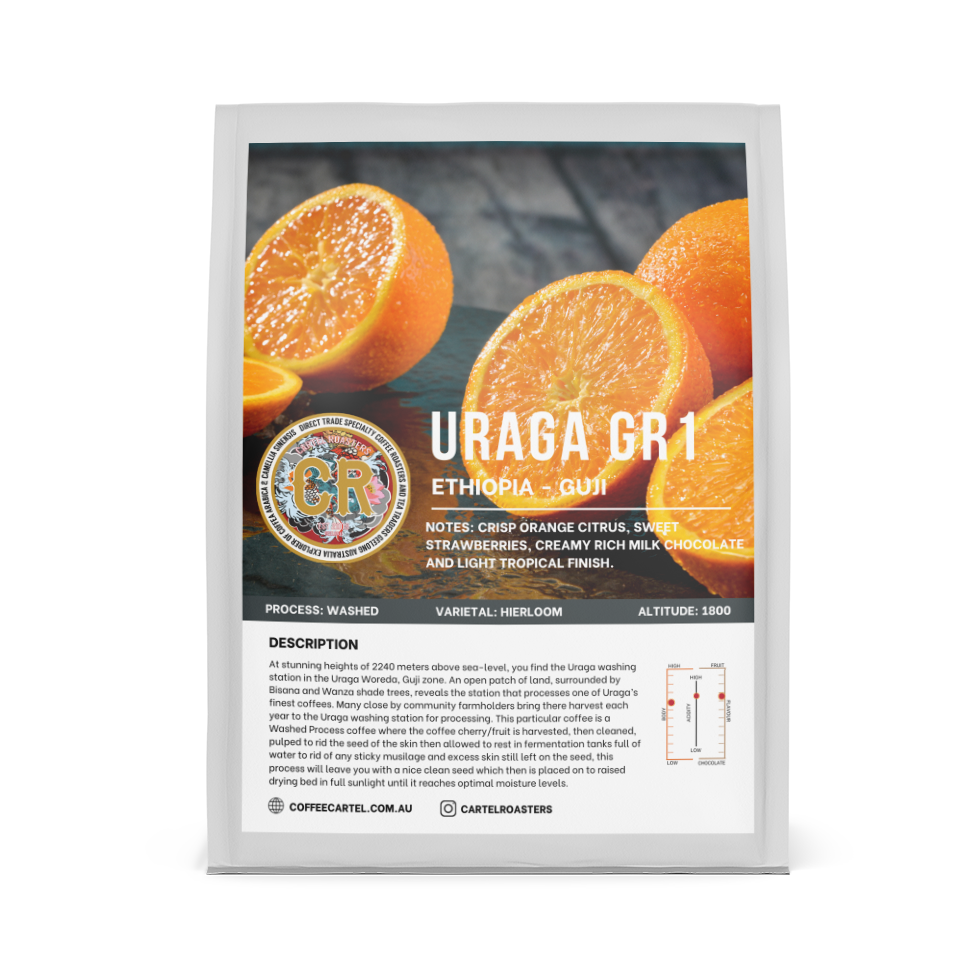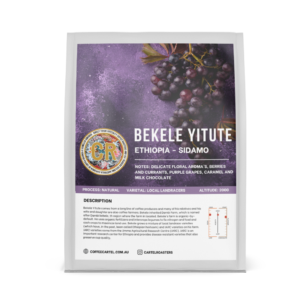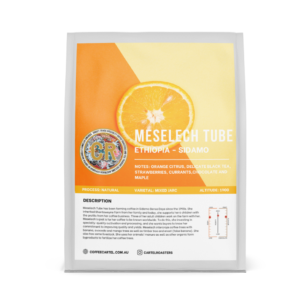About this coffee
- Altitude: 1800 MASL
- Farmer: URAGA
- COUNTRY: ETHIOPIA
NOTES: CRISP ORANGE CITRUS, SWEET STRAWBERRIES, CREAMY RICH MILK CHOCOLATE AND LIGHT TROPICAL FINISH.
At stunning heights of 2240 meters above sea-level, you find the Uraga washing station in the Uraga Woreda, Guji zone. An open patch of land, surrounded by Bisana and Wanza shade trees, reveals the station that processes one of Uraga’s finest coffees. Many close by community farmholders bring there harvest each year to the Uraga washing station for processing. This particular coffee is a Washed Process coffee where the coffee cherry/fruit is harvested, then cleaned, pulped to rid the seed of the skin then allowed to rest in fermentation tanks full of water to rid of any sticky musilage and excess skin still left on the seed, this process will leave you with a nice clean seed which then is placed on to raised drying bed in full sunlight until it reaches optimal moisture levels.
Coffee all started in Ethiopia in the 9th Century when the goat-herder Kaldi, noticed his goats acting more spritely after consuming cherries from a certain plant. Kaldi tried the cherries and noticed some of the familiar effects that we all feel when we enjoy some of the good drink in the morning. While this is a popular account of the ‘Discovery’ of coffee, there are other accounts of traders chewing cherries on trade routes from Ethiopia in order to increase energy. Ethiopia’s history is full of dramatic changes. Over the last four decades, the Ethiopian people have lived under three different forms of government, which include a semi-feudal imperial, a military rule with Marxist ideological orientation from 1974-1991, and a federal governance system from 1991 until the present. All of these periods have been accompanied by dissatisfaction, armed resistance and rebellions. Ethiopia has also confronted economic, social and environmental problems including a war with Eritrea from 1998-2000. This recent dispute with Eritrea as well other historical conflicts has provoked many damages, including lost lives, limited access to the land, emotional trauma, and extreme hunger.
Coffee still grows wild in Ethiopia’s mountain forests. Ethiopian farmers cultivate coffee in four different systems, which include forest coffee, semi-forest coffee, garden coffee and plantation coffee. About 98% of the coffee in Ethiopia is produced by peasants on small farms and it is the country’s most important export. Ethiopia is Africa’s third largest coffee producer. There are about 700,000 coffee smallholders in Ethiopia, of which 54 percent are in semi forest areas. Coffee has been part of their indigenous cultural traditions for more than 10 generations.
Coffee is traded on the Ethiopian Commodities exchange (ECX) which unique to many other countries sets its own prices. Ethiopia Produced 7.1 Million Bags of Coffee in 2017-2018. Most Ethiopian Coffee goes to Germany and Saudi Arabia (about 20% Each) while Australia takes 2%. While most coffee does go through the ECX, reforms recently passed by the government have allowed larger farms and co-ops to market and sell their coffees directly to consumers, resulting in increased traceability and fairer pricing
ETHIOPIA – URAGA GR1 – GUJI – WASHED PROCESS





